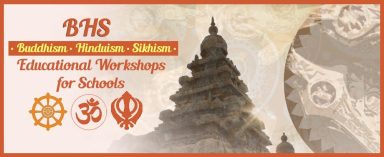Secondary Education Modules
Below are a selection of some of the modules we cover for KS3 and KS4 students.

Academic Presentation
Illuminated intellects consistently exhibit a profound interest in the philosophical tenets of the Vedas and other Eastern scriptures. We offer this enduring wisdom with clarity and contemporary relevance, tailored specifically for the modern youth. Many students find these pre-sentations intellectually stimulating.

Questions and Answers
Inspired and intrigued by the insights gained during the interactive session, students deepen their understanding by engaging in interviews with the presenter. Questions range from the fundamental concept of existence to why do bad things happen to good people. All questions are clearly answered with many references to scripture and historical incidences.

Respect and Hospitality
Understanding the Eastern concepts of the spiritual self and its profound influence on various aspects of life, from the customary greeting of "Namaste" to the etiquette of hosting a guest, is essential. This recognition underscores the significance of respect and connection within interpersonal interactions, reflecting a deeper appreciation for the spiritual dimension inherent in everyday life.

Meditation and Relaxation
It is essential for young individuals to acquire tools to effectively manage the stresses they encounter both within and outside the educational environment. One valuable approach we advocate is the instruction of pranayama breathing techniques derived from yogic practices, which can significantly contribute to enhancing mental health.

Dressup and Role Play
A multitude of narratives elucidate fundamental concepts and cultural phenomena within Hinduism, and there is no more effective method to engage with these stories than to immerse oneself in them.

Mock Hindu Wedding
Our mock Hindu wedding serves as an exceptional framework for educating participants about various dimensions of Hindu culture. This immersive experience provides an engaging and com-prehensive session, fostering deep involvement and understanding of the subject matter.
